Statement by the President of the Republic of Tajikistan, H.E. Mr. Emomali Rahmon at the High level Side event on the margins of the UN SUMMIT for sustainable development “Catalyzing Implementation and Achievement of the Water-related SDGs”
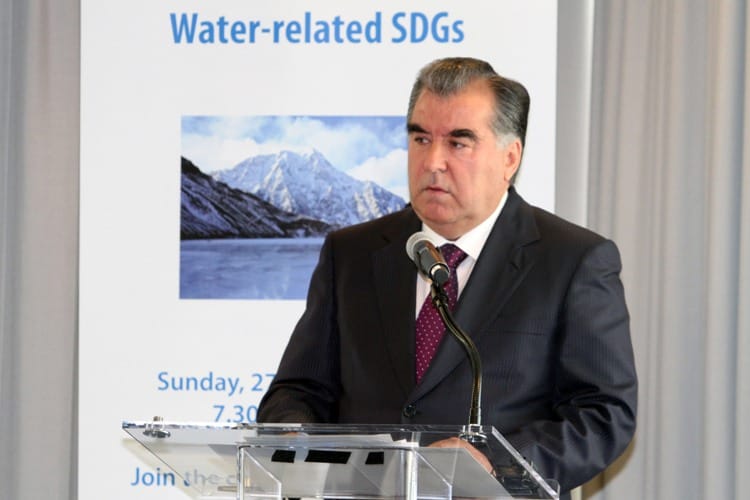
27.09.2015. United State of America
Excellency Mr. Jan Eliasson, Deputy Secretary-General,
Your Excellency General Prayut Chan-o-cha, Prime Minister of the Kingdom of Thailand,
Excellency Ms. Helen Clark, UNDP Administrator
Distinguished Ministers,
Ladies and Gentlemen,
First of all, I would like to welcome you to the High level side event and extend my appreciation for your willingness to engage in today’s discussion on such a crucial subject as “Catalyzing Implementation and Achievement of the Water-related MDGs”.
At the beginning, I would like to extend my appreciation to the members of Steering Committee of the “Water Friends” Group, in particular, to the Permanent Missions of Finland, Hungary, Switzerland, Thailand and Tajikistan to the UN, as well as to the UNDP for the organization of the event.
As all of you might be aware, during the International Decade of Action “Water for Life, 20105-2015” the international community achieved significant progress in the implementation of the internationally agreed goals on water, including advocating and promoting the MDG goals on water and sanitation. We believe that all these achievements became possible due to the adoption and realization of new approaches and coordinated efforts at national, regional and international levels.
The primary goal of the “Water for Life” Decade proclaimed on December 23, 2003 by the initiative of Tajikistan was to promote efforts at meeting the international commitments on water and sanitation by 2015, with the focus was on furthering cooperation at all levels.
The past Decade was a time of considerable changes in the water sector, and beyond. We witnessed improvements in coordination of water policy on the global level, both within the UN, and among the member states.
We regard as a big accomplishment the increase of awareness and participation of civil society in this process. Within the Decade framework there was adopted a long-term strategy and plan of action on a global level, and importantly, a political process was set in motion.
It is worth mentioning that the Decade also contributed to the increase of engagement of different stakeholders. It also helped to establish an interaction between governmental and non-governmental actors, to engage women, youth, business and academia in discussion of water-related issues. In addition, there were set up relevant structures and mechanisms aimed at strengthening of inter-agency coordination during the Decade.
Ladies and Gentlemen,
The Government of Tajikistan, the country initiator of the International Water Decade, has undertaken a number of measures at the national, regional and global level for its successful implementation. To this end, the Tajikistan Government, in cooperation with the UN and other international organizations, hosted in the city of Dushanbe the following major international water events:
• International Conference of Transboundary Rivers (2005);
• International Conference on Water Disasters Reduction (2008);
• International High level conference on mid-term comprehensive review of the implementation of the International Decade for Action “Water for Life”, 2005-2015 (2010);
• International High level conference on water cooperation, 2013;
• International High level conference on the Implementation of the International Decade for Action “Water for Life”, 2005-2015 (2015)
In addition, by the initiative of Tajikistan and in compliance with the relevant UNGA resolutions, the High level interactive dialogues were organized during the 64th , 67th and 69th UNGA sessions, which were dedicated to the review of the implementation of the International Decade for Action “Water for Life”, launching of the International Year of Water Cooperation, 2013, and the 20th anniversary of proclamation of World Water Day.
Ladies and Gentlemen,
Despite tangible progress achieved during the Decade, the gaps and difficulties that emerged in the course of its implementation have created certain obstacles. Thus, despite considerable achievements in addressing the MDGs target on water, the target on sanitation remains unachieved. At the same time, different levels of implementation of these targets in the regions, developed and developing countries, towns and villages, rich and poor population continue to raise concern.
Today about 750 million people in the world do not have access to clean drinking water, and 2.5 billion people lack relevant access to basic sanitation. Approximately 1.3 billion people do not have access to electricity. The average annual economic damage caused by natural disasters, exceeds 60 billion US dollars, and droughts and desertification threaten the source of income of over 1.2 billion people the world over.
There is no doubt that the global climate change and demographic situation will considerably affect the above processes. According to the expert estimations, by 2050 the world population will be equal to 9 billion people, which will result in a considerable increase of water consumption.
It is expected, that by that moment, as a result of climate change impact, more than 50 percent of the world population will be facing water scarcity.
This situation demands that the international community should undertake more consolidated efforts and adopt both urgent and long-term measures to address the existing problems. Given the above, at the 7th World Water Forum we put forward an initiative to declare a new International Decade entitled “Water for Sustainable Development”. I believe that the new Decade will become very instrumental in the implementation of the water related SDGs.
I am confident that the new decade will reinforce the progress achieved during the International Decade “Water for Life”, and will create a solid platform for consolidation of our efforts aimed at further management of water issues for the post 2015 period.
Dear Friends,
Our knowledge and experience gained during the “Water for Life” Decade will enable us to take joint efforts at eliminating the barriers we encounter on our way towards achievement of all water related goals. They will also assist us in meeting the remaining challenges, within the new agenda for sustainable development for the post 2015 period.
In this regard, we consider the proposal on the new Decade as a timely initiative, and call on member states to support it. We believe that a dignified life for future generations can be ensured only through joint efforts.
For this reason, the support of those existing initiatives that could help to facilitate meeting water-related commitments at the national, regional and global levels, and coordination of our activities in this area are becoming a matter of top priority.
In conclusion, I would like to once again thank all of you for interest in and commitment to the dialogue, which helps to identify our future measures and actions aimed at addressing the issues of sustainable management of water resources and sanitation to the benefit of our future generations.
Thank you for attention.











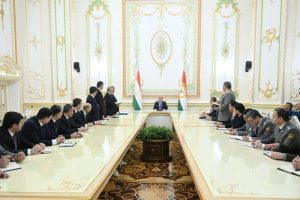 President Emomali Rahmon Makes Personnel Appointments
President Emomali Rahmon Makes Personnel Appointments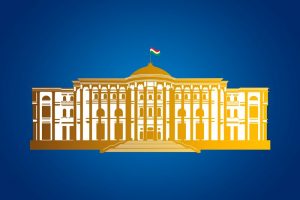 Congratulatory Message of His Excellency Emomali Rahmon, President of the Republic of Tajikistan, on the 33rd Anniversary of the Armed Forces
Congratulatory Message of His Excellency Emomali Rahmon, President of the Republic of Tajikistan, on the 33rd Anniversary of the Armed Forces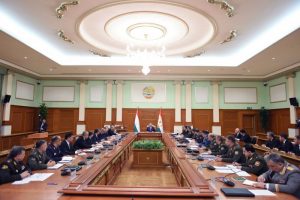 President Emomali Rahmon Holds Security Council meeting
President Emomali Rahmon Holds Security Council meeting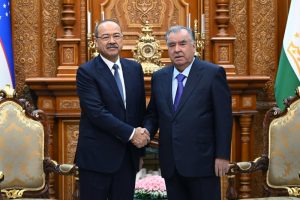 President Emomali Rahmon Receives the Prime Minister of the Republic of Uzbekistan Abdulla Aripov
President Emomali Rahmon Receives the Prime Minister of the Republic of Uzbekistan Abdulla Aripov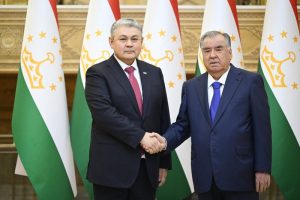 President Emomali Rahmon, Received the Minister of Foreign Affairs of the Republic of Kazakhstan
President Emomali Rahmon, Received the Minister of Foreign Affairs of the Republic of Kazakhstan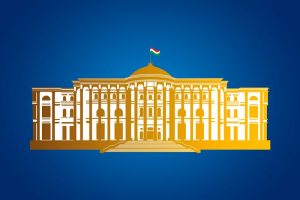 President Emomali Rahmon Enacts New Laws
President Emomali Rahmon Enacts New Laws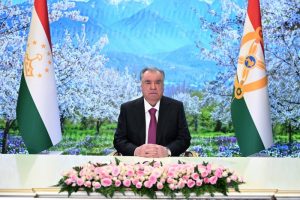 President Emomali Rahmon Sends Festive Greetings to President Xi for Chinese New Year
President Emomali Rahmon Sends Festive Greetings to President Xi for Chinese New Year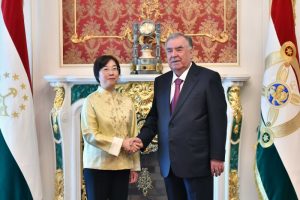 President Emomali Rahmon Receives AIIB President Zou Jiayi in Dushanbe
President Emomali Rahmon Receives AIIB President Zou Jiayi in Dushanbe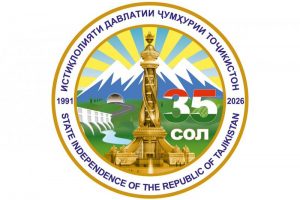 President Emomali Rahmon Approves Emblem for the 35th Anniversary of Tajikistan’s State Independence
President Emomali Rahmon Approves Emblem for the 35th Anniversary of Tajikistan’s State Independence














